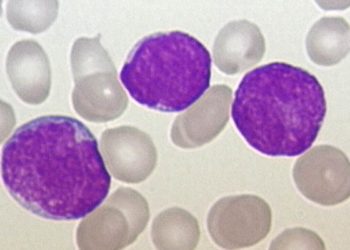No evidence of reliable biomarkers of postacute sequelae of SARS-CoV-2
1. In this follow-up analysis of a cohort of patients from the RECOVER study, there was no clinically meaningful difference in 25 routine laboratory biomarkers between those likely and unlikely to have postacute sequelae of COVID.
2. Participants with a known history of infection had a lower mean platelet count, higher HbA1c, and higher urinary albumin-creatinine ratio compared to participants with no known prior infection.
Evidence Rating Level: 2 (Good)
Study Rundown: Postacute sequelae of SARS-CoV-2 infection (PASC), known colloquially as long COVID, has affected many people globally and become a large public health burden. While efforts have been made to describe common symptoms of PASC, one persistent challenge with characterizing this entity is that no clinical biomarkers have been validated in a study with a sufficient sample size and representative population. This nationwide study was designed to identify whether SARS-CoV-2 infection had lasting changes seen on laboratory results independent of symptom history. The study also sought to determine if those with symptoms likely to represent PASC had changes on laboratory values compared to those unlikely to have PASC. At the 6-month timepoint, patients with a known history of SARS-CoV-2 infection generally had a higher HbA1c, a lower mean platelet count, and a higher urinary albumin-creatinine ratio compared to those without a history of infection. However, there was no evidence of a difference in any of the routinely collected laboratory values when comparing the groups likely and unlikely to have PASC. In exploratory analyses, however, there were some elevations in inflammatory markers and changes in electrolyte balance across different PASC phenotypes. This study was limited by a lack of assay and protocol standardization across sites, as well as a lack of pre-infection laboratory results. Nonetheless, these findings suggest that routine laboratory studies may not serve as useful metrics by which to evaluate PASC.
Click to read the study in AIM
Relevant Reading: Development of a definition of postacute sequelae of SARS-CoV-2 infection
In-Depth [prospective cohort]: The RECOVER initiative recruited adult participants from 84 sites across more than 30 states. Individuals were eligible to participate regardless of whether they had previously been infected with SARS-CoV-2. Participants were deemed ineligible if their 6-month visit was within 30 days of a COVID infection, if they had no symptom data, or if they did not start the protocol. A total of 10,094 participants (8746 with a previous infection and 1348 without a previous infection) met the eligibility criteria. Patients were scored on the previously developed PASC index, which included symptoms such as post-exertional malaise, brain fog, and dizziness; a score of 12 was the optimal threshold above which participants were considered likely to have PASC. Of the participants with a prior SARS-CoV-2 infection, 1880 (21.5%) participants had a PASC index of 12 or higher while 3351 (38.3%) participants had a PASC index of zero. No clinically significant differences in laboratory values were found between these two groups. However, participants with known prior infection were found to have a higher mean hemoglobin A1c (HbA1c) level (5.58% [CI, 5.56% to 5.60%] vs. 5.46% [CI, 5.40% to 5.51%]); a higher urinary albumin-creatinine ratio (uACR) (81.9 [CI, 67.5 to 96.2] vs. 43.0 [CI, 25.4 to 60.6] mg/g); and a lower mean platelet count (265.9 x 109 cells/L [95% CI, 264.5 to 267.4 x 109 cells/L] vs. 275.2 x 109 cells/L [CI, 268.5 to 282.0 x 109 cells/L]) compared to those without a previous infection. The difference in HbA1c levels was reduced after excluding 867 participants with pre-existing diabetes (5.40% [CI, 5.39% to 5.42%] vs. 5.37% [CI, 5.33% to 5.41%]. However, the between-group difference in mean platelet count persisted after excluding 640 participants with pre-existing immunocompromising conditions. Overall, these results suggest that results of laboratory testing may correlate poorly with symptoms of PASC.
Image: PD
©2024 2 Minute Medicine, Inc. All rights reserved. No works may be reproduced without expressed written consent from 2 Minute Medicine, Inc. Inquire about licensing here. No article should be construed as medical advice and is not intended as such by the authors or by 2 Minute Medicine, Inc.








